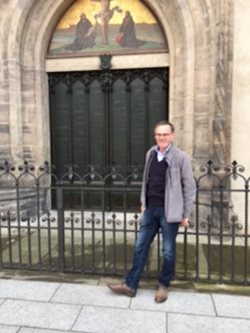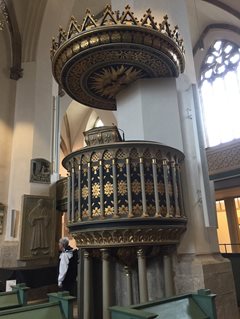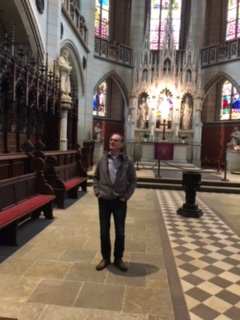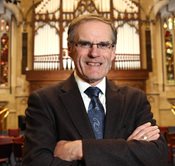In the spring Florence and I decided we would mark the quincentenary of the Reformation by going to Wittenberg where it all started. We arranged the trip last minute, which resulted in a complicated and long journey that included three flights and a few trains, but we got there in the end and it was still worth it!
We stayed in the Luther Hotel and for a few days we were completely engrossed in the composition of the fascinating story of Luther in Lutherstadt Wittenberg. The whole adventure of being where the Reformation was initiated was overwhelming and surreal.
Humbling and inspirational moments
 We saw the ‘Theses Door’ at the All Saints’ Castle Church where it is reputed the Reformation began on 31st October 1517. The door we saw was the two winged bronze door, which contains the text of the 95 Theses embossed in minuscule Latin script. The original wooden door, which actually acted as the university notice board, was destroyed by fire during the Seven Years’ War in 1760, but is was still humbling to stand and imagine the doorway where he made his historic 95 Theses public.
We saw the ‘Theses Door’ at the All Saints’ Castle Church where it is reputed the Reformation began on 31st October 1517. The door we saw was the two winged bronze door, which contains the text of the 95 Theses embossed in minuscule Latin script. The original wooden door, which actually acted as the university notice board, was destroyed by fire during the Seven Years’ War in 1760, but is was still humbling to stand and imagine the doorway where he made his historic 95 Theses public.
We visited ‘Luther House’, a monastery that became the home of Luther, his wife, Katharina von Bora, their six children as well as numerous lodgers and students. We also visited the City Church of St. Mary, known as the ‘Mother Church of the Reformation’. It was here that Luther was married, preached most of his sermons and new Protestant ministers were ordained.
 To see the pulpit and to sit in a pew in the church where Luther established his preaching ministry was inspirational. The emphasis on the Scriptures and preaching of God’s Word became central to the worship of the reformers and remains fundamental to the worship of Presbyterians - the sermon continues to be the central element to all services of worship.
To see the pulpit and to sit in a pew in the church where Luther established his preaching ministry was inspirational. The emphasis on the Scriptures and preaching of God’s Word became central to the worship of the reformers and remains fundamental to the worship of Presbyterians - the sermon continues to be the central element to all services of worship.
The spark that began it all was Luther experiencing a lightning bolt of inspiration. He realised that personal salvation is a gift that God gives us; Christ’s righteousness is given to us when we have faith in Him: “The righteous shall live by faith” (Romans 1:17).
The memorable expression of his momentous discovery is found in The Heidelberg Disputation when Luther wrote, “The law says, ‘Do this,’ and it is never done. Grace says, “Believe in this,’ and everything is already done.”
A fresh perspective
 Reflecting on Luther’s story in Wittenberg, the place where a pious monk struggled with his faith and conscience and experienced his spiritual conversion, provided a new and fresh perspective on the Reformation for me.
Reflecting on Luther’s story in Wittenberg, the place where a pious monk struggled with his faith and conscience and experienced his spiritual conversion, provided a new and fresh perspective on the Reformation for me.
It was surreal to be in the building where Luther had his transformation, which he described like this, “I grasped that the righteousness of God is that righteousness by which through grace and sheer mercy God justifies us through faith. Thereupon I felt myself to be reborn and to have gone through open doors into paradise.”
Our visit also gave me a radical insight into the community and the environment where he lived, and where the scene was set for this world changing transformation of church and theology. The 16th century may have been the turning point for the European church, and subsequent centuries recorded turbulent times and many atrocities, but the Reformation has not been restricted to a moment in history.
A continually reforming church
The true reformation of the church is the continuing nature of reform. The Church in obedience to the Holy Spirit must be a continually reforming church; reformed and constantly being reformed.
As I said on the Opening Night of this year’s General Assembly, I find it quite awesome to think that I am Moderator in 2017, the year of the 500th anniversary of the Reformation. We will be celebrating this momentous event next week, with ‘Faith at the Crossroads’ at three special events in Dublin (17th), Londonderry (18th) and Belfast (19th). I hope you can join me.
Photos: (1) Dr. McNeely outside the famous doorway of Wittenberg’s All Saints’ Castle Church where 500 years ago Martin Luther nailed his 95 Theses to the door (2) The pulpit in the City Church of St. Mary, also known as the ‘Mother Church of the Reformation’, where Dr. Luther preached from (3) Dr. McNeely walking through Castle Church.
 Rt. Rev. Dr. Noble McNeely is the Moderator of the General Assembly of the Presbyterian Church in Ireland of the Presbyterian Church in Ireland for the year 2017/2018 and is minister of First Holywood Presbyterian Church in County Down.
Rt. Rev. Dr. Noble McNeely is the Moderator of the General Assembly of the Presbyterian Church in Ireland of the Presbyterian Church in Ireland for the year 2017/2018 and is minister of First Holywood Presbyterian Church in County Down.
For insights into the Moderator's year in office, activities and events, follow him on Twitter @pcimoderator. You can find more details on Faith at the Cross Roads here.
For other blogs on the Reformation use the category filter to select Reformation 500. To download the Faith at the Crossroads Evening Celebration programme click here.